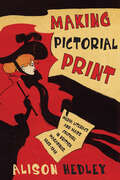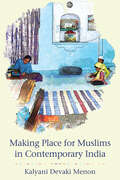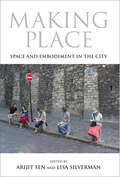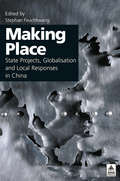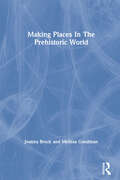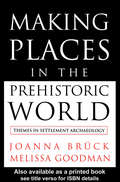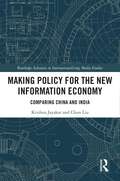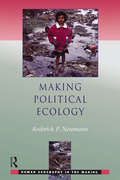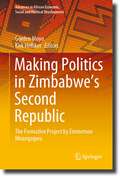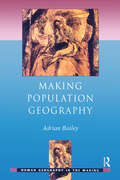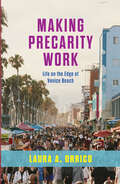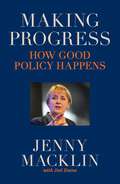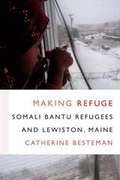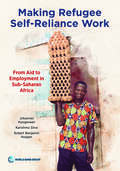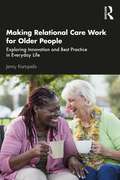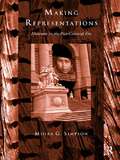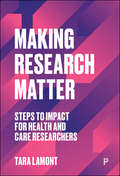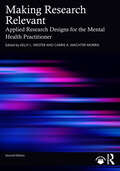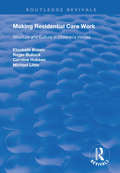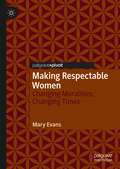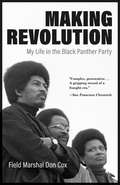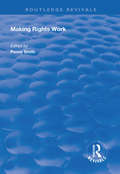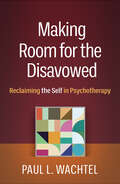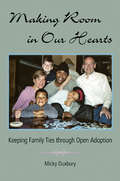- Table View
- List View
Making Pictorial Print: Media Literacy and Mass Culture in British Magazines, 1885–1918 (Studies in Book and Print Culture)
by Alison HedleyAt the end of the nineteenth century, print media dominated British popular culture, produced in greater variety and on a larger scale than ever before. Within decades, new visual and auditory media had ushered in a mechanized milieu, displacing print from its position at the heart of cultural life. During this period of intense change, illustrated magazines maintained a central position in the media landscape by transforming their letterpress orientation into a visual and multimodal one. Ultimately, this transformation was important for the new media cultures of the twentieth and twenty-first centuries. Making Pictorial Print recovers this chapter in the history of new media, applying concepts from media theory and the digital humanities to analyse four popular late-Victorian magazines – the Illustrated London News, the Graphic, Pearson’s Magazine, and the Strand – and the scrapbook media that appropriated them. Using the concept of media literacy, these case studies demonstrate the ways in which periodical design aesthetics affected the terms of engagement presented to readers, creating opportunities for them to participate in and even contribute to popular culture. Shaped by publishers, advertisers, and readers themselves, the pages of these periodicals document the emergence of modern mass culture as we know it and offer insight into the new media of our digital present.
Making Place for Muslims in Contemporary India
by Kalyani Devaki MenonMaking Place for Muslims in Contemporary India looks at how religion provides an arena to make place and challenge the majoritarian, exclusionary, and introverted tendencies of contemporary India.Places do not simply exist. They are made and remade by the acts of individuals and communities at particular historical moments. In India today, the place for Muslims is shrinking as the revanchist Hindu Right increasingly realizes its vision of a Hindu nation. Religion enables Muslims to re-envision India as a different kind of place, one to which they unquestionably belong. Analyzing the religious narratives, practices, and constructions of religious subjectivity of diverse groups of Muslims in Old Delhi, Kalyani Devaki Menon reveals the ways in which Muslims variously contest the insular and singular understandings of nation that dominate the sociopolitical landscape of the country and make place for themselves. Menon shows how religion is concerned not just with the divine and transcendental but also with the anxieties and aspirations of people living amid violence, exclusion, and differential citizenship. Ultimately, Making Place for Muslims in Contemporary India allows us to understand religious acts, narratives, and constructions of self and belonging as material forces, as forms of the political that can make room for individuals, communities, and alternative imaginings in a world besieged by increasingly xenophobic understandings of nation and place.
Making Place: Space And Embodiment In The City
by Arijit Sen Lisa SilvermanSpace and place have become central to analysis of culture and history in the humanities and social sciences. Making Place examines how people engage the material and social worlds of the urban environment via the rhythms of everyday life and how bodily responses are implicated in the making and experiencing of place. The contributors introduce the concept of spatial ethnography, a new methodological approach that incorporates both material and abstract perspectives in the study of people and place, and encourages consideration of the various levels--from the personal to the planetary--at which spatial change occurs. The book's case studies come from Costa Rica, Colombia, India, Austria, Italy, the United Kingdom, and the United States.
Making Place: State Projects, Globalisation and Local Responses in China
by Stephan FeuchtwangTo make a place is to create a location where its creators can feel they belong. Processes of place-making are still very much ongoing today. Geographers, sociologists, political scientists and philosophers of advanced capitalism have said that place is a localisation of the global. However, the creation of a place is not legible from such grand perspectives. It is also much more creative than can be predicted by translating large-scale processes into local cultures. Anthropologists have been sensitive to the intimate, tragic and lyrical senses of local place. But their theorising has been too much bound up with cosmology and insufficiently with the intermediate scales of state and local state. In this book, Stephan Feuchtwang and his contributors offer a set of historical, anthropological and scale-mediated studies from China - a country that includes a subcontinental variety of cultures and landscapes. In the twentieth century it experienced collapse in civil war and was then reasserted as a particularly strong state. Now it is managing the fastest growing capitalist economy in the world. These intriguing Chinese studies contribute to the anthropology of place and space, providing an historical perspective on processes of change and of accommodation to disruption. The stories they tell are fascinating in their own right, but in addition, the result is a critical reformulation of previous theories of place that geographers, philosophers, historians, and anthropologists will find of great interest.
Making Places In The Prehistoric World: Themes In Settlement Archaeology
by Joanna Bruck Melissa GoodmanFirst published in 1999. This groundbreaking volume addresses issues central to the study of prehistoric settlement including group memory, the transmission of ideology and the impact of mobility and seasonality on the construction of social identity. Building on these themes, the contributors point to new ways of understanding the relationship between settlement and landscape by replacing Capitalist models of spatial relations with more intimate histories of place.
Making Places in the Prehistoric World: Themes in Settlement Archaeology
by Joanna Bruck Melissa GoodmanThis groundbreaking volume addresses issues central to the study of prehistoric settlement including group memory, the transmission of ideology and the impact of mobility and seasonality on the construction of social identity. Building on these themes, the contributors point to new ways of understanding the relationship between settlement and landscape by replacing Capitalist models of spatial relations with more intimate histories of place.
Making Policy for the New Information Economy: Comparing China and India (Routledge Advances in Internationalizing Media Studies)
by Chun Liu Krishna Prasad JayakarThis volume is a theoretically informed comparative analysis of the telecommunications and information policy-making process in two major developing economies, China and India. With a focus on how policies are made rather than what those policies are, the book investigates how policy actors interact within institutional structures to define policy problems and identify potential solutions. The authors explain the evolution of these policy-making systems as the two countries liberalized their economies and opened their media and telecommunications systems to competition over the past two-and-a-half decades. With applications in numerous international contexts, this book will be of interest to scholars and practitioners in public policy studies, telecommunications, business, development economics, political science, Asian studies, and public administration.
Making Political Ecology (Human Geography in the Making)
by Rod NeumannMaking Political Ecology presents a comprehensive view of an important new field in human geography and interdisciplinary studies of nature-society relations. Tracing the development of political ecology from its origins in geography and ecological anthropology in the 1970s, to its current status as an established field, the book investigates how late twentieth-century developments in social and ecological theories are brought together to create a powerful framework for comprehending environmental problems.Making Political Ecology argues for an inclusionary conceptualization of the field, which absorbs empirical studies from urban, rural, First World and Third World contexts and the theoretical insights of feminism, poststructuralism, neo-Marxism and non-equilibrium ecology. Throughout the book, excerpts from the writings of key figures in political ecology provide an empirical grounding for abstract theoretical concepts.Making Political Ecology will convince readers of political ecology's particular suitability for grappling with the most difficult questions concerning social justice, environmental change and human relationships with nature.
Making Politics in Zimbabwe’s Second Republic: The Formative Project by Emmerson Mnangagwa (Advances in African Economic, Social and Political Development)
by Kirk Helliker Gorden MoyoThe book provides a fresh and innovative interpretation of the new government of Zimbabwe led by Emmerson Mnangagwa, which emerged in late 2017 after the downfall of Robert Mugabe. It demonstrates the contradictory character of the Mnangagwa government, involving both continuities and discontinuities in relation to Mugabe’s regime . The temptation amongst Zimbabwean scholars has been to focus on the continuities and to dismiss the significance of any discontinuities, notably reform measures. This book adopts an alternative approach by identifying and focusing specifically on the existence of a formative project of the Mnangagwa’s Second Republic, further analysing its political significance, as well as risks and limitations. While doing so, the book covers topics such as reform measures, reconciliation, transitional justice, corruption, the media, agriculture, devolution, and the debt crisis as well as health and education. Discussing the limitations of these different reform measures, the book highlights that any scholarly failure to identify the risks of the project leads to an incomplete understanding of what constitutes the Mnangagwa’s Second Republic. The book appeals to students, scholars and researchers of Zimbabwean and African studies, political science and international relations, as well as policymakers interested in a better understanding of political reform processes.
Making Population Geography (Human Geography in the Making)
by Adrian BaileyMaking Population Geography is a lively account of the intellectual history of population geography, arguing that, while population geography may drift in and out of fashion, it must continue to supplement its demographic approach with a renewed emphasis on cultural and political accounts of compelling population topics, such as HIV-AIDS, sex trafficking, teen pregnancy, citizenship and global ageing, in order for it to shed light on contemporary society. Making Population Geography draws both on the writings of those like Wilbur Zelinsky and Pat Gober who were at the very epicentre of spatial science in the 1960s and those like Michael Brown and Yvonne Underhill-Sem whose post-punk introspections of method, content and purpose, now push the field in new directions. Using a wide range of case studies, contemporary examples and current research, the book links the rise and fall of the key concepts in population geography to the changing social and economic context and to geographys turn towards social theory. Referencing the authors classroom experiences both in the US and the UK, Making Population Geography will appeal to students studying geography, population issues and the development of critical scholarship.
Making Precarity Work: Life on the Edge of Venice Beach
by Laura A. OrricoShows how the precarious workers of Venice Beach—without help from the government—work together to create a safety net for themselves. In Making Precarity Work, sociologist Laura A. Orrico shows how Los Angeles’s Venice Beach boardwalk, which is a magnet for tourists, is also a workplace, one that wouldn’t exist without the motley crew of people selling art, drinking, performing, using drugs, and working odd jobs who gather daily to engage in varied activities, from selling crafts to minding each other’s wares and asking for spare change. Throughout the book, Orrico lifts up this workplace as a collective accomplishment, demonstrating how it can be a safety net to manage insecurity and inequality for those opting into its flexible and precarious structure, as well as how the LA government’s efforts to stabilize this work often disrupt the success of this collaborative and creative ecosystem. She also presents the ways this work can exacerbate those very inequalities. Sharing the personal stories of boardwalk workers, Orrico considers these juxtaposed realities and asks her audience to question how we can and should respond to a society whose best option for the disadvantaged is precarity.
Making Progress: How good policy happens
by Jenny Macklin Joel DeaneIs big policy reform still possible? Does Australia have the political will to tackle generational issues such as climate change, the housing crisis, rising inequality and Closing the Gap? Legendary Labor policymaker Jenny Macklin believes that if Australia wants to remain prosperous and fair, big policy reform is not just possible, it's essential. Making Progress takes us into the policy engine room and details how Macklin went about developing transformational initiatives such as the Apology to the Stolen Generations, paid parental leave and the National Disability Insurance Scheme, as well as delivering pension reforms that lifted one million Australians out of poverty. She explains how she became a policy wonk, and interviews key policymakers such as Julia Gillard, Brian Howe, Bill Kelty, Tanya Plibersek and Ross Garnaut, who share how they war-gamed ways to turn good policy ideas into reality. Part policy memoir, part war-room drama, part field guide, Making Progress: How Good Policy Happens is a political book with a message-and a method.
Making Race and Nation: A Comparison of South Africa, the United States, and Brazil
by Anthony W. MarxIn this bold, original and persuasive book, Anthony W. Marx provocatively links the construction of nations to the construction of racial identity. Using a comparative historical approach, Marx analyzes the connection between race as a cultural and political category rooted in the history of slavery and colonialism, and the development of three nation states. He shows how each country's differing efforts to establish national unity and other institutional impediments have served, through the nation-building process and into their present systems of state power, to shape and often crystallize categories and divisions of race. Focusing on South Africa, Brazil and the United States, Marx illustrates and elucidates the historical dynamics and institutional relationships by which the construction of race and the development of these nations have informed one another. Deftly combining comparative history, political science and sociological interpretation, sharpened by over three-hundred interviews with key informants from each country, he follows this dialogue into the present to discuss recent political mobilization, popular protest and the current salience of race issues. Anthony W. Marx is Associate Professor of Political Science at Columbia University and has been a Visiting Professor at Yale University
Making Refuge: Somali Bantu Refugees and Lewiston, Maine
by Catherine BestemanHow do people whose entire way of life has been destroyed and who witnessed horrible abuses against loved ones construct a new future? How do people who have survived the ravages of war and displacement rebuild their lives in a new country when their world has totally changed? In Making Refuge Catherine Besteman follows the trajectory of Somali Bantus from their homes in Somalia before the onset in 1991 of Somalia's civil war, to their displacement to Kenyan refugee camps, to their relocation in cities across the United States, to their settlement in the struggling former mill town of Lewiston, Maine. Tracking their experiences as "secondary migrants" who grapple with the struggles of xenophobia, neoliberalism, and grief, Besteman asks what humanitarianism feels like to those who are its objects and what happens when refugees move in next door. As Lewiston's refugees and locals negotiate coresidence and find that assimilation goes both ways, their story demonstrates the efforts of diverse people to find ways to live together and create community. Besteman's account illuminates the contemporary debates about economic and moral responsibility, security, and community that immigration provokes.
Making Refugee Self-Reliance Work: From Aid to Employment in Sub-Saharan Africa
by Johannes Hoogeveen Karishma Silva Robert Benjamin HopperMaking Refugee Self-Reliance Work: From Aid to Employment in Sub-Saharan Africa advocates for the enhancement of refugee self reliance as a strategic, humane, development approach to refugee assistance. Facilitating refugees’ capacity to support themselves through gainful work not only upholds their dignity and autonomy but also offers socioeconomic benefits to host communities by unlocking opportunities for shared investment and development. The report demonstrates how refugee self-reliance in Sub-Saharan Africa remains elusive and identifies various reasons why this is the case: encampment limits the scope for self-reliance; restrictions on refugees’ right to work hinder self-sufficiency; small allocations of infertile land make even subsistence farming impossible; aid delivery in specific areas contributes to settlement patterns in which skills and economic opportunities do not match; economic development in remote, resource-scarce regions is unsustainable; and dependence on aid shifts funding priorities from long-term development to unproductive care and maintenance models. To overcome these challenges, the report outlines five areas for policy action: 1) Ending restrictive encampment policies; 2) Boosting refugees’ economic participation; 3) Supporting host communities; 4) Reshaping financing and investment models; 5) Investing in preparedness. Success requires committed leadership from host governments, as well as coordinated engagement and sustained support from humanitarian organizations and development partners.
Making Relational Care Work for Older People: Exploring Innovation and Best Practice in Everyday Life
by Jenny KartupelisThis book explores the concept of relational care, what it feels like for older people and for carers, why it makes life happier and how those involved in residential or community care can make it work. Relational care is gaining traction as its benefits to individuals and society become recognised. This accessible book, based on real-life models and in-depth interviews, explores fresh ways that relational care can be facilitated in a variety of settings. It looks at practice in terms of team management, support for care workers, technology, design and architecture, intergenerational and multidisciplinary models, and their implications for resilience, wellbeing, policy and future funding. Chapters are arranged by theme and provide descriptions, learning points and resources for each model, as well as incorporating a wealth of interviews giving insights into the lived experience of relational care. This is a lively book full of realistic ideas and information for everyone who wants to find out more about, access or implement the best in care – the best for older people, their families, care workers, management and society.
Making Representations: Museums in the Post-Colonial Era (Heritage: Care-Preservation-Management)
by Moira G. SimpsonDrawing upon material from Britain, Canada, the United States, Australia and New Zealand, Making Representations explores the ways in which museums and anthropologists are responding to pressures in the field by developing new policies and practices, and forging new relationships with communities. Simpson examines the increasing number of museums and cultural centres being established by indigenous and immigrant communities as they take control of the interpretive process and challenge the traditional role of the museum. Museum studies students and museum professionals will all find this a stimulating and valuable read.
Making Research Matter: Steps to Impact for Health and Care Researchers
by Tara LamontEPDF and EPUB available Open Access under CC-BY-NC-ND licence. Written by a leading expert in the field, this practical and accessible book is an essential guide to knowledge exchange, impact and research dissemination in health and social care. Providing the why, what, who, how and when of research impact, the book helps researchers turn raw findings into useful, high-impact evidence for policymakers, practitioners and the public. It includes insightful interviews from leading journalists, science communicators, researchers and influencers in health and social care, as well as practical exercises, insider tips and case studies. The book will help researchers at all stages of their career to maximise the impact of their work.
Making Research Relevant: Applied Research Designs for the Mental Health Practitioner
by Carrie A. Wachter Morris Kelly L. WesterMaking Research Relevant is the ideal core textbook for master’s-level introduction to research methods courses in any mental health field. Accessible and user friendly, it is designed to help trainees and practitioners understand, connect, and apply research to clinical practice and day-to-day work with students and clients.The text covers foundational concepts, such as research ethics, the consumption of research, and how to analyze data, as well as an additional 11 applied, evaluative, and outcome-based research methods that can be applied in practice. Easy to read, conversational chapters are infused with case examples from diverse settings, paired with brief video lectures and a practice-based application section which provide vignettes and practice to guide application and visual components that demonstrate how research methods can benefit mental health practitioners in real-world scenarios.
Making Residential Care Work: Structure and Culture in Children's Homes (Routledge Revivals)
by Elizabeth Brown Roger Bullock Michael Little Caroline HobsonThis book was originally published in 1998, when over 6,000 children lived in residential homes in England and Wales. The fact that some children's homes are better than others is well established, but why should this be so? Past answers have tended to be tautologous - rather on the lines of 'a good home is one where children do well; children do well because they are in a good home.' This study examines various aspects of children's homes and explores the connections between them in an attempt to break down the old circular argument. Structures are discernible in the relationship between different types of goals - societal, formal and belief; the variable balance between these goals determines staff cultures, which, in turn, shape the child cultures that develop. Such relationships are important because of their close association with outcomes - whether the children do well, whether the homes prosper. The model described in the book provides a conceptual framework and a set of causal relationships that should help professionals to plan and manage residential care better and so meet the needs of vulnerable children more effectively.
Making Respectable Women: Changing Moralities, Changing Times
by Mary EvansThis book studies the ways in which the assessment of being or not being ‘respectable’ has been applied to women in the UK in the past one hundred and fifty years. Mary Evans shows how the term ‘respectable’ has changed and how, most importantly, the basis of the ways in which the respectability of women has been judged has shifted from a location in women’s personal, domestic and sexual behaviour to that of how women engage in contemporary forms of citizenship, not the least of which is paid work. This shift has important social and political implications that have seldom been explored: amongst these are the growing marginalisation of the validation of the traditional care work of women, the assumption that paid work is implicitly and inevitably empowering and the complex ways in which respectability and conformity to highly sexualised conventions about female appearance have been normalised. Making Respectable Women makes use of archive material to show how the changing definition of a moral and social concept can have an impact on both the behaviour and the choices of individuals and the operations of institutional power. It will be of interest to students and scholars across the humanities and social sciences.
Making Revolution: My Life in the Black Panther Party
by Field Marshal Don CoxMaking Revolution is Don Cox’s revelatory, even incendiary account of his years in the Black Panther Party. He had participated in many peaceful Bay Area civil rights protests but hungered for more militant action. His book tells the story of his work as the party’s field marshal in charge of gunrunning to planning armed attacks—tales which are told for the first time in this remarkable memoir—to his star turn raising money at the Manhattan home of Leonard Bernstein (for which he was famously mocked by Tom Wolfe in Radical Chic and Mau-Mauing the Flak Catchers), to his subsequent flight to Algeria to join Eldridge Cleaver in exile, to his decision to leave the party following his disillusionment with Huey P. Newton’s leadership. Cox would live out the rest of his life in France, where he wrote these unrepentant recollections in the early 1980s, enjoining his daughter to promise him that she would do everything she could to have them published.
Making Rights Work (Routledge Revivals)
by Penny SmithFirst published in 1999, this edited collection of essays explores various perspectives on making rights work in South Africa, Canada, the USA and the UK, along with pieces on gender, political, LGBT and British legal rights. The volume was inspired by recent strides forward at the time, including the South African Constitution adopted on the 8th of May 1996, and sought to provide a snapshot of rights debates at the time.
Making Room for the Disavowed: Reclaiming the Self in Psychotherapy
by Paul L. WachtelIn this uniquely integrative book, Paul L. Wachtel describes powerful clinical strategies to make room for aspects of the self that were sidetracked in the course of development. Wachtel explores how early attachment experiences can lead people to turn away from certain thoughts and feelings, building a sense of self and ways of interacting on only a limited range of adaptive resources. His approach draws on psychodynamic, humanistic, systemic, and acceptance-centered cognitive-behavioral perspectives, as well as attention to the impact of race, class, and culture. Filled with rich case material, the book illuminates how a therapeutic approach anchored in the present can help heal the wounds of the past.
Making Room in Our Hearts: Keeping Family Ties through Open Adoption
by Micky DuxburyAdopted persons face challenges their entire lives as they struggle to answer the most basic question: Who am I? The hope of open adoption is that adopted children will develop stronger identities if they have the opportunity to develop healthy ongoing relationships with their families of origin. Making Room in Our Hearts offers an intimate look at how these relationships evolve over time, with real-life stories from families who have experienced open adoption first-hand. This book helps both adoptive and birth parents address their fears and concerns, while offering them the support to put the child’s psychological and spiritual needs at the center of adoption. Based on interviews with more than one hundred adopted children, birth and adoptive parents, extended families, professionals and experts, the book is an effective and invaluable resource for those considering open adoption, those experiencing it, and professionals in the field. Openness has altered the landscape of adoption, and Making Room in Our Hearts will help us catch up to the reality that is open adoption today.
